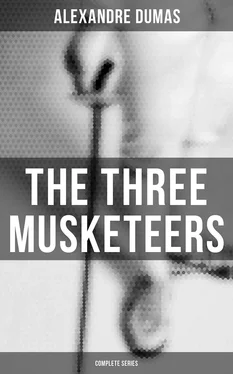“The executioner may kill, without being on that account an assassin,” said the man in the red cloak, rapping upon his immense sword. “This is the last judge; that is all. NACHRICHTER, as say our neighbors, the Germans.”
And as he bound her while saying these words, Milady uttered two or three savage cries, which produced a strange and melancholy effect in flying away into the night, and losing themselves in the depths of the woods.
“If I am guilty, if I have committed the crimes you accuse me of,” shrieked Milady, “take me before a tribunal. You are not judges! You cannot condemn me!”
“I offered you Tyburn,” said Lord de Winter. “Why did you not accept it?”
“Because I am not willing to die!” cried Milady, struggling. “Because I am too young to die!”
“The woman you poisoned at Bethune was still younger than you, madame, and yet she is dead,” said d’Artagnan.
“I will enter a cloister; I will become a nun,” said Milady.
“You were in a cloister,” said the executioner, “and you left it to ruin my brother.”
Milady uttered a cry of terror and sank upon her knees. The executioner took her up in his arms and was carrying her toward the boat.
“Oh, my God!” cried she, “my God! are you going to drown me?”
These cries had something so heartrending in them that M. d’Artagnan, who had been at first the most eager in pursuit of Milady, sat down on the stump of a tree and hung his head, covering his ears with the palms of his hands; and yet, notwithstanding, he could still hear her cry and threaten.
D’Artagnan was the youngest of all these men. His heart failed him.
“Oh, I cannot behold this frightful spectacle!” said he. “I cannot consent that this woman should die thus!”
Milady heard these few words and caught at a shadow of hope.
“d’Artagnan, d’Artagnan!” cried she; “remember that I loved you!”
The young man rose and took a step toward her.
But Athos rose likewise, drew his sword, and placed himself in the way.
“If you take one step farther, d’Artagnan,” said he, “we shall cross swords together.”
D’Artagnan sank on his knees and prayed.
“Come,” continued Athos, “executioner, do your duty.”
“Willingly, monseigneur,” said the executioner; “for as I am a good Catholic, I firmly believe I am acting justly in performing my functions on this woman.”
“That’s well.”
Athos made a step toward Milady.
“I pardon you,” said he, “the ill you have done me. I pardon you for my blasted future, my lost honor, my defiled love, and my salvation forever compromised by the despair into which you have cast me. Die in peace!”
Lord de Winter advanced in his turn.
“I pardon you,” said he, “for the poisoning of my brother, and the assassination of his Grace, Lord Buckingham. I pardon you for the death of poor Felton; I pardon you for the attempts upon my own person. Die in peace!”
“And I,” said M. d’Artagnan. “Pardon me, madame, for having by a trick unworthy of a gentleman provoked your anger; and I, in exchange, pardon you the murder of my poor love and your cruel vengeance against me. I pardon you, and I weep for you. Die in peace!”
“I am lost!” murmured Milady in English. “I must die!”
Then she arose of herself, and cast around her one of those piercing looks which seemed to dart from an eye of flame.
She saw nothing; she listened, and she heard nothing.
“Where am I to die?” said she.
“On the other bank,” replied the executioner.
Then he placed her in the boat, and as he was going to set foot in it himself, Athos handed him a sum of silver.
“Here,” said he, “is the price of the execution, that it may be plain we act as judges.”
“That is correct,” said the executioner; “and now in her turn, let this woman see that I am not fulfilling my trade, but my debt.”
And he threw the money into the river.
The boat moved off toward the left-hand shore of the Lys, bearing the guilty woman and the executioner; all the others remained on the right-hand bank, where they fell on their knees.
The boat glided along the ferry rope under the shadow of a pale cloud which hung over the water at that moment.
The troop of friends saw it gain the opposite bank; the figures were defined like black shadows on the red-tinted horizon.
Milady, during the passage had contrived to untie the cord which fastened her feet. On coming near the bank, she jumped lightly on shore and took to flight. But the soil was moist; on reaching the top of the bank, she slipped and fell upon her knees.
She was struck, no doubt, with a superstitious idea; she conceived that heaven denied its aid, and she remained in the attitude in which she had fallen, her head drooping and her hands clasped.
Then they saw from the other bank the executioner raise both his arms slowly; a moonbeam fell upon the blade of the large sword. The two arms fell with a sudden force; they heard the hissing of the scimitar and the cry of the victim, then a truncated mass sank beneath the blow.
The executioner then took off his red cloak, spread it upon the ground, laid the body in it, threw in the head, tied all up by the four corners, lifted it on his back, and entered the boat again.
In the middle of the stream he stopped the boat, and suspending his burden over the water cried in a loud voice, “Let the justice of God be done!” and he let the corpse drop into the depths of the waters, which closed over it.
Three days afterward the four Musketeers were in Paris; they had not exceeded their leave of absence, and that same evening they went to pay their customary visit to M. de Treville.
“Well, gentlemen,” said the brave captain, “I hope you have been well amused during your excursion.”
“Prodigiously,” replied Athos in the name of himself and his comrades.
Table of Contents
On the sixth of the following month the king, in compliance with the promise he had made the cardinal to return to La Rochelle, left his capital still in amazement at the news which began to spread itself of Buckingham’s assassination.
Although warned that the man she had loved so much was in great danger, the queen, when his death was announced to her, would not believe the fact, and even imprudently exclaimed, “it is false; he has just written to me!”
But the next day she was obliged to believe this fatal intelligence; Laporte, detained in England, as everyone else had been, by the orders of Charles I, arrived, and was the bearer of the duke’s dying gift to the queen.
The joy of the king was lively. He did not even give himself the trouble to dissemble, and displayed it with affectation before the queen. Louis XIII, like every weak mind, was wanting in generosity.
But the king soon again became dull and indisposed; his brow was not one of those that long remain clear. He felt that in returning to camp he should re-enter slavery; nevertheless, he did return.
The cardinal was for him the fascinating serpent, and himself the bird which flies from branch to branch without power to escape.
The return to La Rochelle, therefore, was profoundly dull. Our four friends, in particular, astonished their comrades; they traveled together, side by side, with sad eyes and heads lowered. Athos alone from time to time raised his expansive brow; a flash kindled in his eyes, and a bitter smile passed over his lips, then, like his comrades, he sank again into reverie.
As soon as the escort arrived in a city, when they had conducted the king to his quarters the four friends either retired to their own or to some secluded cabaret, where they neither drank nor played; they only conversed in a low voice, looking around attentively to see that no one overheard them.
Читать дальше












